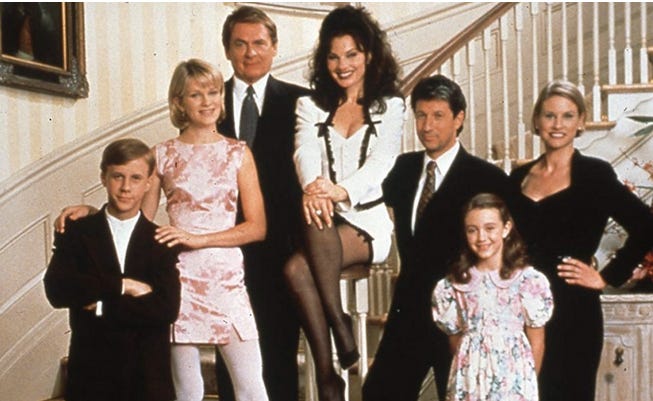The only Jewish sitcom

“The Nanny” is the only one of the 1990s sitcoms to be what others are remembered as: Jewy. Overtly, unlike “Seinfeld” and “Friends.” “Friends” atrocious so we will skip but “Seinfeld” is a Balzacian exploration of the full richness of human experience. But it’s evasive and awkward on the Jewishness front. There’s George Costanza, ostensibly Italian on at least his father’s side, but also the Jewiest character ever, as in he makes Alvy Singer look Episcopalian. This is not even getting into the Elaine Benes as “shiksa” plot, which is approximately like if there had been an episode of “The Nanny” where Fran Fine’s allure was gentile-ness. Which there never would have been, because “The Nanny” wasn’t like that.
“The Nanny” is a Jew’s-eye view of the world. Non-Jews are the weirdos, with their emotional restraint (a myth) and drinking (also a myth, kind of; plenty of hard-drinking Jews). Jewish is normal, WASP is Other, Italian-American, Other-adjacent. Everyone else doesn’t really exist in the show’s universe, but this seems true to the universe it represents.
What allows “The Nanny” this freedom? Two things come to mind: Fran being a woman, and Fran being distinctly, garishly, working-class. Or maybe middle-class but rounded to working-class via proximity to the wealth-embodying Maxwell Sheffield and family. Yes, the show evades Jews and money anxieties by equating Jewishness with modest means, and non-Jewishness with being Lady Mary, or the manor-house family in a “Midsomer Murders.” (Pardon the televisual anachronism.) Jewishness is ethnic, distinctive, specific, particular, all of those hyphenated-identity things, but this is inoffensive because it signifies an absence of privilege. It’s not that Jews have to be shtetl-dwellers to be sympathetic, but it’s not entirely unlike that trope.
The gender thing, then: Fran is a “JAP” in the sense of being the cultural figure who perhaps most comes to mind re: that stereotype, but also very definitively not a princess in the sense of, she has to marry into money, and marry a gentile at that. There’s no father paying her bills. She’s no Brenda Potemkin. Fran is a working girl, in a not exactly euphemistic sense.
And then nor, in her pairing with Mr. Sheffield, is there the “Dirty Dancing” dynamic. Fran is earthy in a highly specific yet general (the show was, I believe, a global success) ethnic way. “I’m a regular Joe who likes my joe regular,” in the words of Martin Crane.
But what genius to pair her with Cece Babcock, to make the “shiksa” (like “JAP,” a slur, I know, I know, not our focus here) epitomize undesirability. If nothing else, for Mr. Sheffield, Cece’s not exotic. I mean she’s American and he’s British but they’re both non-Jews and might as well, for the purposes of the show, be brother and sister.
Do Jewish men enter into it? In maybe a vague sense of hopes that Fran will marry a Jewish doctah or lawyah, but does she, or her mother, actually hope this? No, this is not my first visit to this particular rodeo. But it still strikes me that Fran Fine gets to out-Jew them all precisely because she’s not in reference to Woody Allen, Philip Roth, Larry David, or those terrible movies where parents are met and Barbra Streisand is for some reason involved.

